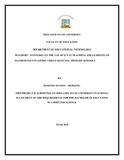Please use this identifier to cite or link to this item:
https://cris.library.msu.ac.zw//handle/11408/4039Full metadata record
| DC Field | Value | Language |
|---|---|---|
| dc.contributor.author | Makono, Antony | - |
| dc.date.accessioned | 2020-12-11T11:57:26Z | - |
| dc.date.available | 2020-12-11T11:57:26Z | - |
| dc.date.issued | 2018 | - |
| dc.identifier.uri | http://hdl.handle.net/11408/4039 | - |
| dc.description.abstract | ICTs have become one of the essential pillars of modern society, therefore the attitude, mastery and understanding of ICT basic skills and concepts by teachers in learning and teaching is imperative. New broadband communication services and convergence of telecommunication with computers have created numerous possibilities to use a variety of new technology tools for teaching and learning system. The Zimbabwean government has put into place the ICT Strategic Plan and created the Ministry of Information and Communication Technology which requires everyone to be computer literate In an attempt to bring the potentials and benefits of the ICTs into schools and the promotion of computer literacy the Government donated computers and other ICT tools such as laptops, data projectors and interactive whiteboards in schools for the school children and their teachers despite these efforts Zimbabwe remains at the bottom ten of ICT Network Readiness. In Gweru Urban most primary schools have computer laboratories and are connected to internet the researcher noted that teachers are not embracing ICT in teaching and learning, continue to favour the traditional methods of teaching which make the lessons more teacher-centred rather than the effective ICT learner centred approach in spite of the availability of ICT tools in schools. It is against this background that the research looked at teachers’ attitude towards ICT use in teaching and learning mathematics in Gweru urban Primary schools in zone B. Data was collected through the use of questionnaires and interviews. A sample of 50 participants were selected from five primary school. The sampled participants were selected from a population of 100 teachers and five head teachers were interviewed. Purposive sampling was used to select the participants. The study used a descriptive survey method as a research design employing mixed methods approach. Data were analysed using frequencies and percentages. Findings revealed that most teachers are scared of using ICT tools. The finding also revealed that the frequency in use of traditional tools and methods are higher than that one of ICT tools and methods. It was also revealed that training of teachers was the most given response as the solution to the challenges of using ICT in teaching and learning Mathematics . The government can electrify schools and provide generators so that electrical power should always be available to avoid technical problems during the use of ICT tools in teaching and learning. | en_US |
| dc.language.iso | en | en_US |
| dc.publisher | Midlands State University | en_US |
| dc.subject | teachers attitudes | en_US |
| dc.subject | information communication technologies | en_US |
| dc.subject | teaching and learning | en_US |
| dc.subject | mathematics | en_US |
| dc.title | Teachers attitudes on the use of ICT in the teaching and learning of mathematics in Gweru urban selected primary schools | en_US |
| dc.type | Thesis | en_US |
| item.openairetype | Thesis | - |
| item.languageiso639-1 | en | - |
| item.fulltext | With Fulltext | - |
| item.cerifentitytype | Publications | - |
| item.openairecristype | http://purl.org/coar/resource_type/c_18cf | - |
| item.grantfulltext | open | - |
| Appears in Collections: | Bachelor Of Education Degree In Computer Science | |
Files in This Item:
| File | Description | Size | Format | |
|---|---|---|---|---|
| makono final project.pdf | Full Text | 1.01 MB | Adobe PDF |  View/Open |
Page view(s)
216
checked on Apr 14, 2025
Download(s)
216
checked on Apr 14, 2025
Google ScholarTM
Check
Items in MSUIR are protected by copyright, with all rights reserved, unless otherwise indicated.



